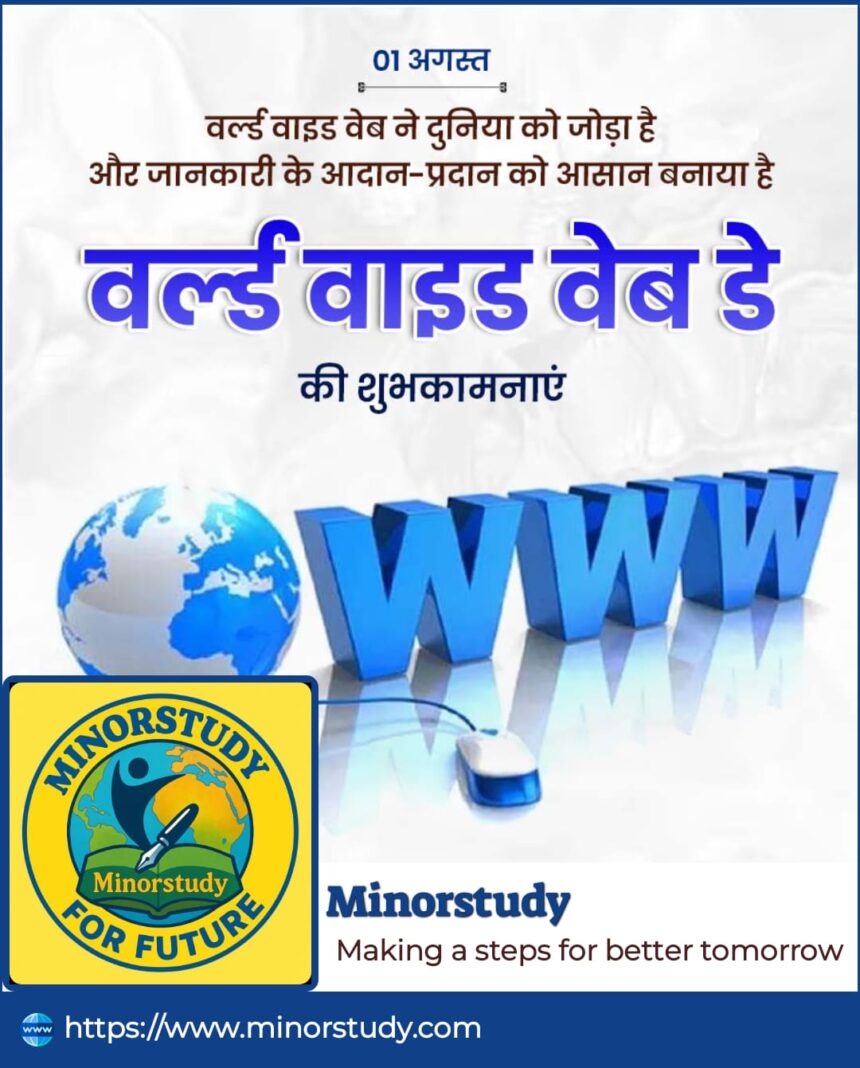🌐 World Wide Web Day – Celebrating the Power of Digital Connectivity That Transformed Our World
🌍 Introduction: The Day That Changed How the World Connects
Imagine a world without Google, email, online banking, social media, or even this very article you’re reading. Hard to picture, right? That’s the magic of the World Wide Web—a revolutionary invention that turned the world into a global village. Every year on August 1, we celebrate World Wide Web Day to honour this groundbreaking innovation that reshaped communication, education, business, governance, and entertainment in the most unimaginable ways.
World Wide Web Day isn’t just a tech celebration; it’s a reminder of our digital evolution, human creativity, and how one invention can uplift millions globally.
📜 History of World Wide Web Day
Inventor: Sir Tim Berners-Lee, a British scientist, invented the World Wide Web (WWW) in 1989 while working at CERN.
Purpose: Initially created to facilitate the automatic sharing of information between scientists across universities and institutes worldwide.
Launch: The first website (info.cern.ch) went live on August 6, 1991, but August 1 is chosen as World Wide Web Day to commemorate the public recognition of the Web’s power and potential.
🔎 Fun Fact: The World Wide Web is not the Internet. The Web is a service that operates over the Internet, allowing you to browse pages, access data, and share information.
📊 9 Fascinating Facts About the World Wide Web
The first website is still online and maintained as a historical page at info.cern.ch.
The abbreviation “WWW” is the most spoken prefix in the world today.
In 1993, there were only 26 websites. Today, there are over 1.8 billion websites globally.
HTML, HTTP, and URLs were invented alongside the Web—forming the core of how we access content.
Sir Tim Berners-Lee gave the World Wide Web to the public for free—no patents, no charges.
The Web enabled open knowledge movements, giving birth to platforms like Wikipedia.
The World Wide Web kickstarted e-commerce, leading to giants like Amazon, eBay, and Shopify.
It democratized information and amplified human rights, activism, and free speech.
Every 10 minutes, over 5 million Google searches are made—a direct impact of the Web’s presence in our lives.
🧭 Timeline of Major Milestones
| Year | Milestone |
|---|---|
| 1989 | Tim Berners-Lee proposed the idea of the Web |
| 1991 | First website went live at CERN |
| 1993 | Mosaic, the first user-friendly web browser launched |
| 1994 | Yahoo! was founded; commercial use of the Web began |
| 1995 | Amazon, eBay launched; birth of e-commerce |
| 2004 | Facebook launched – social media era began |
| 2007 | Rise of smartphones; Web became mobile-friendly |
| 2020 | Internet usage surged during COVID-19 – the Web became essential |
| 2025 | AI-powered web experiences dominate the digital landscape |
❓ Frequently Asked Questions (FAQs)
Q1. What is the World Wide Web?
Ans: The World Wide Web (WWW) is a system of interlinked hypertext documents and resources, accessible via the Internet using a web browser.
Q2. Is World Wide Web the same as the Internet?
Ans: No. The Internet is the infrastructure of networks, while the Web is a service that runs on the Internet, enabling access to webpages.
Q3. Who invented the Web?
Ans: Sir Tim Berners-Lee, in 1989, while working at CERN.
Q4. Why is World Wide Web Day celebrated on August 1?
Ans: While the Web was publicly introduced on August 6, 1991, August 1 is celebrated to recognize its impact on global digital transformation.
Q5. What are some real-life uses of the Web today?
Ans: Online education, banking, healthcare consultations, shopping, social networking, remote work, digital governance, activism, etc.
💡 Significance of World Wide Web Day
💻 1. Democratization of Information
Before the Web, knowledge was confined to libraries or institutions. Now, anyone with an internet connection can access vast educational resources, empowering even the most remote learner.
🛒 2. Birth of the Digital Economy
From online shopping to global freelance marketplaces, the Web has created millions of jobs and entrepreneurs, fuelling economies worldwide.
🧠 3. Transforming Education & Learning
E-learning platforms, online degrees, coding bootcamps—the Web made learning borderless, flexible, and inclusive.
📢 4. Platform for Free Speech & Social Impact
Movements like #MeToo, Black Lives Matter, and climate activism gained global traction through the Web. It gives voice to the voiceless.
🤝 5. Connecting Humanity
Families across continents, businesses across borders, and minds across ideologies—the Web makes global interaction seamless.
🏥 6. Healthcare at Your Fingertips
Telemedicine, online diagnostics, and awareness campaigns—the Web is a life-saving tool in healthcare delivery.
🌐 7. Gateway to Governance
With e-governance portals, public grievance systems, and online services, citizens are now more empowered than ever before.
🥳 Wishing on World Wide Web Day
🖥️ “Here’s to the invention that connected hearts, ideas, and dreams across the world. Happy World Wide Web Day!”
🌐 “May we continue to use the Web ethically, wisely, and compassionately, so it remains a tool for progress and peace.”
✅ Key Observance Activities
Tech workshops and webinars on digital literacy and online safety.
Student competitions on Web innovations and ethical hacking.
Corporate seminars on AI, cybersecurity, and the future of the Web.
Tributes to Sir Tim Berners-Lee and awareness of open internet rights.
🎯 Importance in Daily Life
The World Wide Web affects almost every activity of modern life:
| Sector | Impact |
|---|---|
| Education | E-learning, online classes, academic databases |
| Business | Online stores, remote work, marketing |
| Healthcare | Online consultations, medical data sharing |
| Communication | Emails, messaging, video calls |
| Banking | Online payments, UPI, digital wallets |
| Entertainment | Streaming platforms, YouTube, gaming |
| Governance | Online services, tax filing, voter registration |
| Employment | Freelancing platforms, LinkedIn, job portals |
🚀 How It Changed the World (In Human Terms)
A Farmer in a rural village can now check weather forecasts, market prices, and government schemes.
A Student in a remote town can now learn coding from MIT via the Web.
A Doctor in India can consult a patient in Africa using telemedicine.
A Grandparent can now video call their grandchildren across the globe.
A Business Owner can now sell products worldwide without a physical shop.
⚠️ Challenges and Responsibilities
With great power comes great responsibility. The Web is not without its challenges:
Misinformation and Fake News
Privacy Violations and Data Theft
Cyberbullying and Online Abuse
Digital Divide (unequal access in rural/poor regions)
World Wide Web Day also reminds us to:
✅ Use the Web ethically
✅ Protect our digital privacy
✅ Promote inclusiveness in access
✅ Advocate for net neutrality
🧾 Conclusion: A Revolution with Purpose
World Wide Web Day is more than a celebration of a tech breakthrough. It’s a tribute to the collective progress of humanity through information sharing, and a call to action for responsible digital citizenship.
Let us honour this day by appreciating the power, responsibility, and privilege the Web brings us—and ensure it remains a positive force for generations to come.








